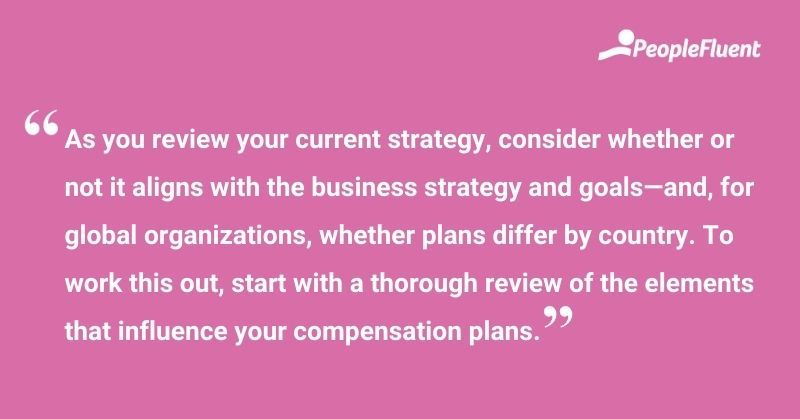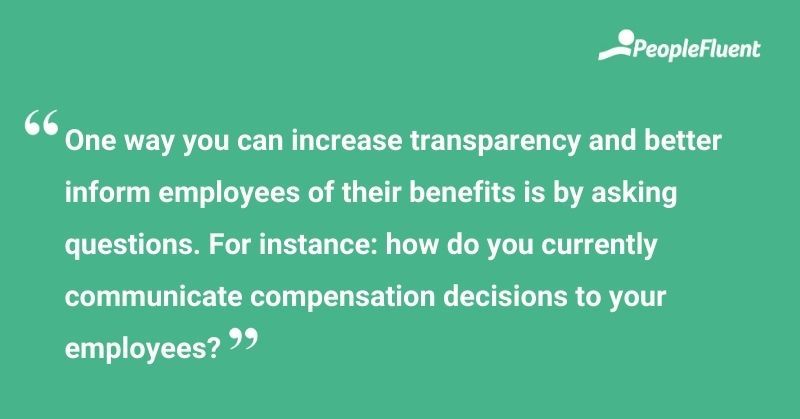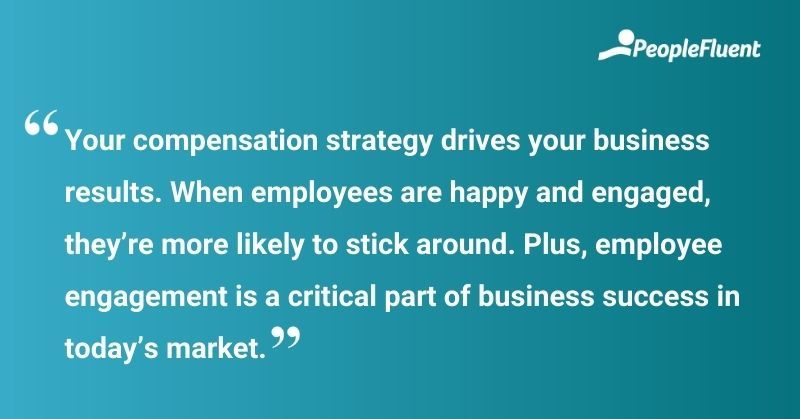Published: Oct 1, 2021Time to read: 4mins Category: Compensation
6 Ways to Align Compensation With Organizational Goals
Compensation management affects everything from your company’s operating budgets to employee engagement and productivity. Done right, a strong compensation program will help you attract high-quality candidates, improve retention rates, and have an overall positive impact on business results. Let’s look at a few ways you can align compensation with organizational goals.
Knowing where to take your current compensation plan begins with a review and documentation of your current pay strategy and practices (if it isn’t already documented). You may find that both areas are quite complicated, with no shortage of factors influencing the budget, employee eligibility, impact of performance on salary increases/rewards, and the administration and timing of pay decisions.
Whether you’re a CFO, CPO, or any other type of comp professional, you already know how much of your operating budget is taken up by compensation. If not, it’s even more important for your payroll and management teams to understand the nuances and complexities of your current compensation strategies. You should also know how your compensation tech can help you set, track, and reach goals.
Let’s look at how you can align compensation with the organizational goals of your company.
KEEP READING | ‘5 Benefits and Must-Have Features of a Compensation Solution’
6 Elements of Your Compensation Plans
As you review your current strategy, consider whether or not it aligns with the business strategy and goals—and, for global organizations, whether plans differ by country. To work this out, start with a thorough review of these six elements:
1. Pay-for-Performance/Merit Increases
How do you currently identify top performers? What factors influence your organization’s merit increases? For example, under a pay-for-performance structure, an employer may compensate employees based on factors such as:
- Goal setting and achievement
- Overall performance assessment
- Contribution relative to peers
- Skills development or competency growth.
A clear view of goals, accomplishments, outcomes, and performance appraisals or feedback is critical in any successful pay-for-performance strategy.

MORE FROM THE BLOG | ‘Having Difficult Hiring Conversations? Not Anymore! 5 Ways to Negotiate Compensation and Land Your Candidate’
2. Incentive Pay/Rewards
If you offer incentive payments, are they part of a contractual obligation, or can they be discretionary? What are the time frames, guidelines, approvals, and requirements for processing and managing incentives?
3. Off-Cycle Rewards
Awards are given for a variety of reasons, most typically in response to outstanding performance. Does your organization offer any type of spot bonus for employees?
How are they budgeted? Who can offer them (managers, co-workers, etc.)? What is the review and approval process?
4. Stock Awards
Do you offer stock awards? If so, to what groups? What are the time frames, guidelines, approvals, and requirements for processing and managing stock grants?

YOU MIGHT ALSO LIKE | ‘4 Dangers of Only Using Spreadsheet Templates for Compensation Planning’
5. Compensation Communication
Many organizations provide total compensation statements to increase transparency and better inform employees of their benefits. How do you currently communicate compensation decisions to your employees? Does your organization use compensation statements? Do you customize statements based on compensation programs, geographic locations, or other factors?
6. Manager Engagement and Education
For most organizations, managers make compensation decisions for their employees. How do you engage and educate managers on your compensation strategy? What data and analytics do you give them to inform those decisions? How do you track manager decisions to ensure they work within your strategy?
Answers to all these questions will help you identify and assess areas that need improvement. As you proceed through selection to implementation, these answers will also help you and your technology provider determine whether process changes are required.
RELATED READING | ‘Driving DE&I With Compensation: How Analytics and Reporting Can Help'
Getting Compensation Right: Why It Really Matters
The bottom line: your compensation strategy drives your business results. When employees are happy and engaged, they’re more likely to stick around. Plus, employee engagement is a critical part of business success in today’s market. It’s also a useful tool for hiring managers as a compensation strategy can help:
- Attract high-quality candidates who will become productive contributors to the organization.
- Improve retention rates (poor pay is a top reason that employees leave) and decrease the cost of attracting/hiring employees.

By investing in the best technology to support your strategy, your organization can squeeze more ROI from your compensation spend. However, companies that are new to performance management—or those making meaningful changes to their programs—often don’t know where to start or recalibrate.
To help your HR teams know that they’re rolling out the right programs, partner with a vendor whose compensation management solutions are equipped with data, analytics, and built-in support.
Ready to Accelerate Your Organization’s Compensation Plan?
Get started by downloading a free copy of ‘The Ultimate Buyers’ Guide for Compensation Management’ today. Or, alternatively, get in touch to talk more about financially rewarding your people.